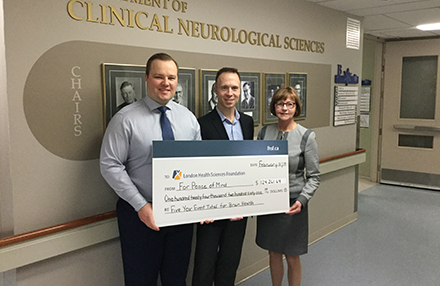Funding received for brain research leading to peace of mind
By: Alicia Baertsoen, BA’17

Left to right, Brett Nicholson, Dr. Matthew Hebb and Judy Kojlak, Interim Director of the Ambulatory Mental Health Care Program.
Thanks to a recent donation from the For Peace of Mind committee, better known as FORPOM, the Department of Clinical Neurological Sciences (CNS) has received a $12,000 dollar donation in support of brain cancer research.
The committee’s original roots lie in funding patient-focused mental health initiatives and raising awareness around mental illness. In 2018, FORPOM expanded its vision, targeting brain health as a whole, including brain cancer research. Their mission is to support research that leads to the accessibility of curative options for all illnesses of the brain.
“We are grateful to receive FORPOM funding to support our brain cancer research. Research funding is extremely difficult to attain and this challenge reduces the ability to perform otherwise promising biomedical studies and train tomorrow’s scientists. Philanthropic support is now more critical than ever. ” says Dr. Matthew Hebb, Associate Professor in the Department of Clinical Neurological Sciences.
Hebb and his team are pioneering Intratumoral Modulation Therapy (IMT), which treats glioblastoma multiforme (GBM), an aggressive brain cancer with currently no effective treatment options. By delivering therapeutic electrical stimulation, IMT reduces the growth of the tumor and weakens its resistance to other therapies. For his research, Dr. Hebb received the Vanguard Innovator of the Year award from the WORLDiscoveries organization in 2017.
FORPOM Committee Chair, Brett Nicholson, believes there is “a desperate need for brain health funding in Ontario, Canada and around the globe, specifically within neuro-oncology, because of how devastating cancers of the brain, like GBM, are to those affected.”
Nicholson notes, “Brain cancer isn’t as common of an issue when compared to the prevalence of mental illness. Public support and awareness around this critical area of medical science can be fleeting. FORPOM is working every day to change that, as sadly many promising research initiatives are forced to suspend their operations because of inadequate funding.”
FORPOM hopes joint research endeavors between mental health and brain research will lead to future advancements, so no patient is without the second chance they deserve.
More information about FORPOM can be found at www.forpom.org.








